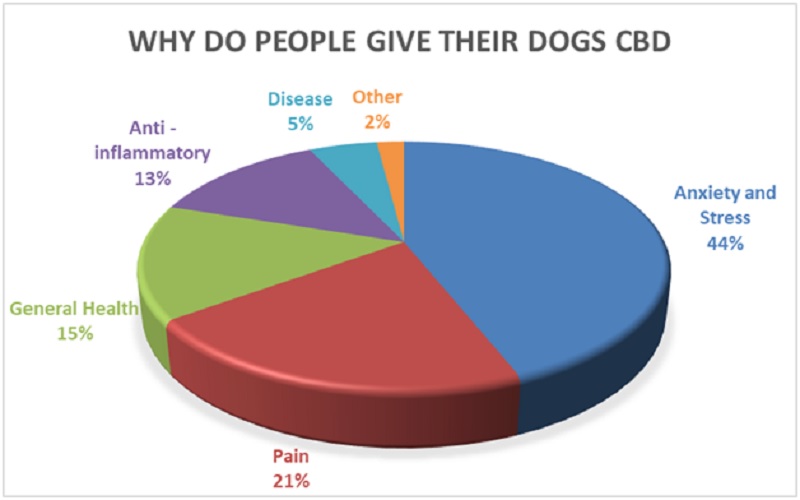In recent years, cannabidiol (CBD) is growing in popularity and use for pets, yet not many pet owners really understand its benefits or how it works. The fact that most CBD products on the market don’t have the FDA seal of approval yet, understandably makes some people a little nervous to consider it for their pet. In this article, I want to share the 10 reasons why it just may be the best natural alternative for your pet’s health. I’ll show you the latest collection of scientific research and expert opinion that backs this up.
CBD stands for cannabidiol, which is an oil extracted from hemp plants. Hemp itself usually has no more than 0.3% THC, while cannabis, which is the marijuana plant, contains 12% THC. So, CBD will not produce a psychoactive effect on your pet. CBD works by impacting the endocannabinoid system in the same way as it does for humans, with the exception that dogs have more receptors in their brains, making it work even better for them.
Why Do Most People Give Their Dog CBD?

Table 1: Data from Leafreport, Emma Stone, Oct 2022
Reason 1: Easing Anxiety and Stress
Dogs can experience separation anxiety and stress. A recent survey conducted by the American Holistic Veterinary Medical Association found that 61.8% of pet owners reported using CBD for anxiety-related issues in their pets. Anxiety which may be mild for a puppy can often increase and become debilitating as the dog approaches a more senior age making medication a necessity. CBD may provide a natural alternative to prescription medication. CBD will interact with the endocannabinoid system in their bodies, promoting a sense of calmness and relaxation. A study published in the journal Neuropharmacology found that CBD reduced anxiety-related behaviors in rats, suggesting its potential for anxiety management in dogs. In a Cornell study, dogs were given CBD chews prior to a stressful event, and 83% showed a decrease in stress or anxiety-related behaviors. More research continues today with different CBD products and dosages to better understand treating dogs effectively with anxiety.
Reason 2: Relieving Pain and Inflammation
Osteoporosis, which is a degenerative joint disease affecting 25% of dogs, can significantly impact a dog’s quality of life. While the use of glucosamine is widely known as an effective treatment for its ability to replenish cartilage, not much is known about CBD. Glucosamine and CBD can in fact be used together in a complementary way as they focus on different aspects. CBD reduces inflammation of the joint and alters pain signals throughout the body.
One of the first CBD studies was done at Cornell University College of Veterinary Medicine, and it showed that CBD was extremely beneficial for pain management. In the study, more than 80% of the dogs with osteoarthritis experienced a decrease in pain, allowing them to go back to their normal day-to-day activity and routine.
Reason 3: Managing Seizures and Epilepsy
Receiving a diagnosis of epilepsy can be life-changing for both the dog and the owner. Often seizures come without notice and are extremely difficult to predict. Studies show that CBD is extremely effective in reducing the frequency and severity of seizures in both humans and animals in combination with traditional prescribed medications.
A groundbreaking study published in the Journal of the American Veterinary Medical Association found that CBD reduced seizure frequency in 89% of dogs with epilepsy. Current research demonstrates that CBD used in combination with traditional seizure medications can be a successful treatment approach. Recently, the FDA approved the first CBD-based prescription medication called Epidiolex for the treatment of seizures in humans, further supporting the potential of CBD use for seizure management in dogs. The goal, as with all seizure medications, is to gain control of seizure activity — reducing it as much as possible, while having minimal side effects and maintaining good quality of life.
4. Supporting Mental Wellness
Dogs, like humans, can experience cognitive decline and behavioral issues. Canine Cognitive Dysfunction (CCD) which is dementia in dogs is real and can be hard for both the owner and pet. CBD has shown promise in supporting mental wellness and cognitive function in aging dogs. While research on CBD and cognitive health in dogs is still in its early stages, the available evidence suggests its potential benefits.
Cannabinoids have been used in humans to reduce the signs of dementia in AD patients. The benefits are decreased distress, agitation, and aggression and improvement in mood, appetite, and sleep quality in AD patients taking cannabis oil. Because CCD is a model for AD, this would suggest that cannabinoids may work in a similar way in canine patients. In a recent scientific review, Integrative Treatment of Canine Cognitive Dysfunction, CBD is recommended as part of a full strategy for dementia in dogs.
5. Skin Conditions
Skin allergies, itching, and dermatitis can cause significant discomfort for dogs. CBD’s anti-inflammatory and soothing properties make it a valuable addition to the treatment of various skin conditions. A study published in the Journal of Clinical Investigation showed that CBD reduced inflammation and skin cell production in a mouse model of psoriasis. While research specifically on CBD and canine skin conditions is scarce, many pet owners have reported positive results when using CBD-infused products for their dogs’ skin issues. Another study by the Australian animal therapeutics company CannPal tested a CBD product for its potential to help dogs with atopy (a dermatologic allergy resulting in itching and chewing). In the trial, dogs were randomly given a CBD product or a placebo for four weeks. The results were encouraging — showing 65% of the CBD dogs having at least a 50% decrease in itching and chewing. Half of the dogs recovered from all signs of itchiness altogether.
6. Boosting Immune Function
A strong immune system is essential for a dog’s overall well-being. CBD has been found to modulate the immune response, helping to regulate immune activity and promote a balanced immune system. A review published in the journal Molecules discussed the role of cannabinoids in inflammation. Its analysis reveals there is evidence that CBD is a potent immunomodulatory drug as it has manifested immunosuppressive properties in the context of sterile inflammation and immunoprotective effects during viral infections (e.g. COVID-19). This means there is the potential to support immune function in dogs. However, further research is still needed to fully understand CBD’s impact on canine immune health.
7. Easing the Symptoms of Cancer
CBD can help ease pain, and inflammation, together with chemotherapy and radiation therapy. CBD can help drastically with symptoms that accompany cancer and its treatments including loss of appetite and nausea. CBD can be an alternative option for owners who decide that want to avoid invasive treatment. The following study in the National Library of Medicine provides more details of the benefits.
8. Improving Sleep Quality
Just like humans, dogs can struggle with sleep disturbances. Dogs need a lot more sleep than humans, so inadequate sleep can impact their health and behavior. CBD’s relaxing effects can help regulate sleep patterns, allowing dogs to enjoy restful and rejuvenating sleep. In 2013, an animal trial research showcased in the Journal of Psychopharmacology showed that CBD has significantly increased the total sleep times for subjects who consume 10 to 40 mg per kilogram of CBD. A 2019 published study in the Permanente Journal on the effects of CBD on sleep has found that individuals who consume CBD products have a 67% higher improvement in their sleep than individuals without CBD. Although there is limited research specifically on CBD’s effect on sleep specifically in dogs, anecdotal evidence from pet owners suggests that CBD can promote better sleep in their furry companions.
9. Enhancing Joint Health
CBD’s anti-inflammatory properties can help dogs with joint conditions caused by osteoarthritis by reducing swelling and reducing pain. A recent canine lab study at Colorado State University conducted by showed that its patented hemp extract could benefit dogs who are experiencing pain and gait issues. The results showed a positive impact on behavior scores, decreased pain scores, and improved mobility for the dogs taking the hemp extract.
10. Digestive Health
Digestive issues may hit your dog in a variety of ways including nausea, vomiting, diarrhea, abdominal pain, and lethargy. They can be hard to diagnose and correct making this a top issue for many pet owners. Studies show that appropriate dosing of CBD can help. British Journal of Pharmacology has a study that shows that CBD can successfully reduce nausea and vomiting in animals.
Conclusion
The global CBD pet market is anticipated to reach a value of USD 399.2 million by 2027. This article highlights 10 common uses of CBD as a holistic medicine for dogs. As scientific research continues, so will the knowledge of CBD uncover and validate even new additional benefits of this wonder product.
When administered in appropriate doses, CBD has minimal side effects and is well-tolerated in animals, with few adverse effects reported. Should you consider investigating CBD for your pet, it is always essential to consult with a veterinarian to determine the appropriate dosage and monitor your dog’s response to CBD. Any new medication must be evaluated against the existing treatment regimen. Lastly, make sure you are using a high-quality product that comes with verified lab analysis.
Check Out more informative information on CBD and find products at CBD for Pets – Pawsh Bandanas

































